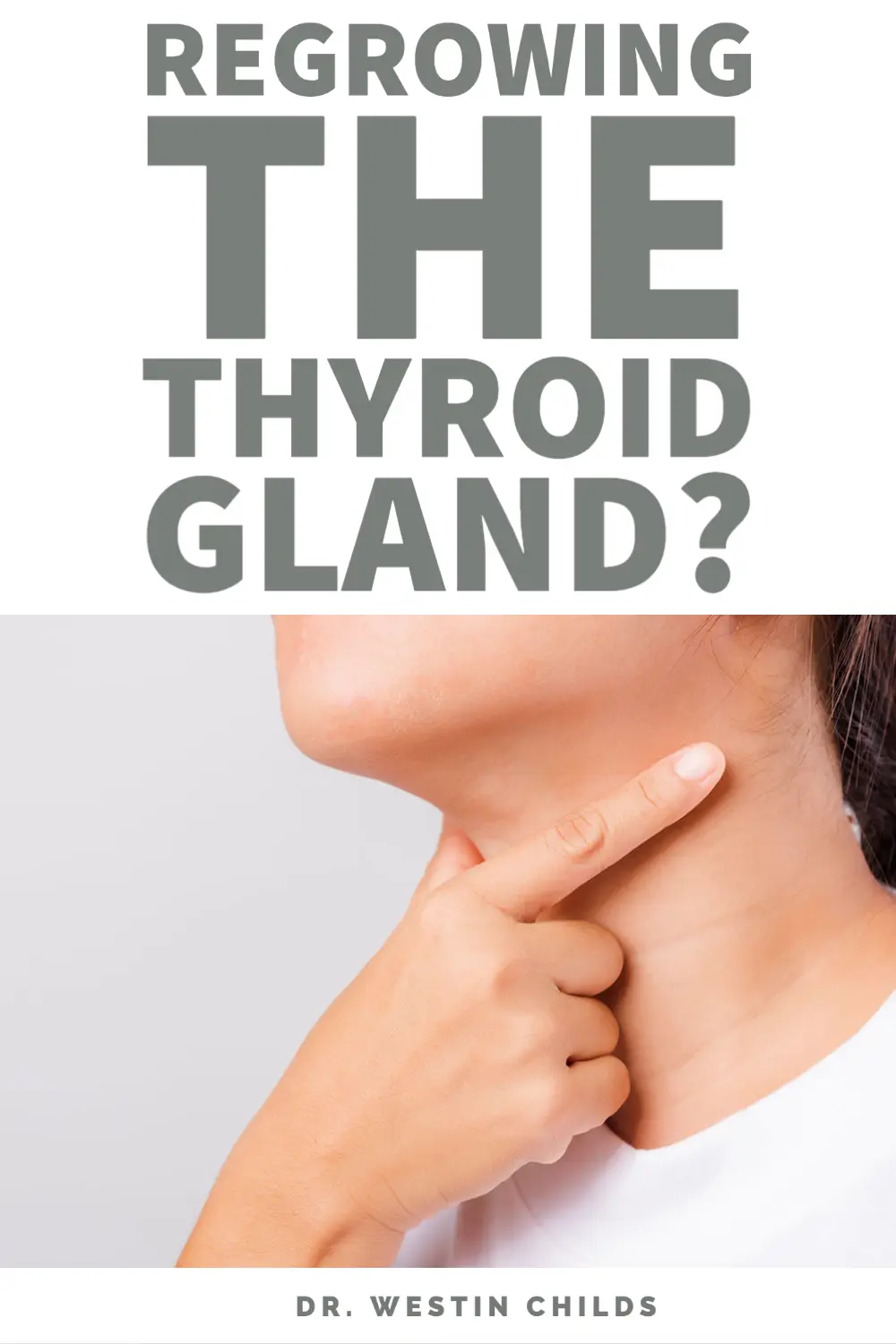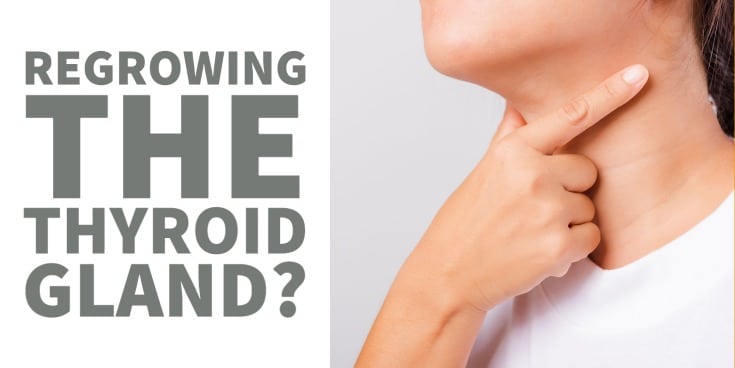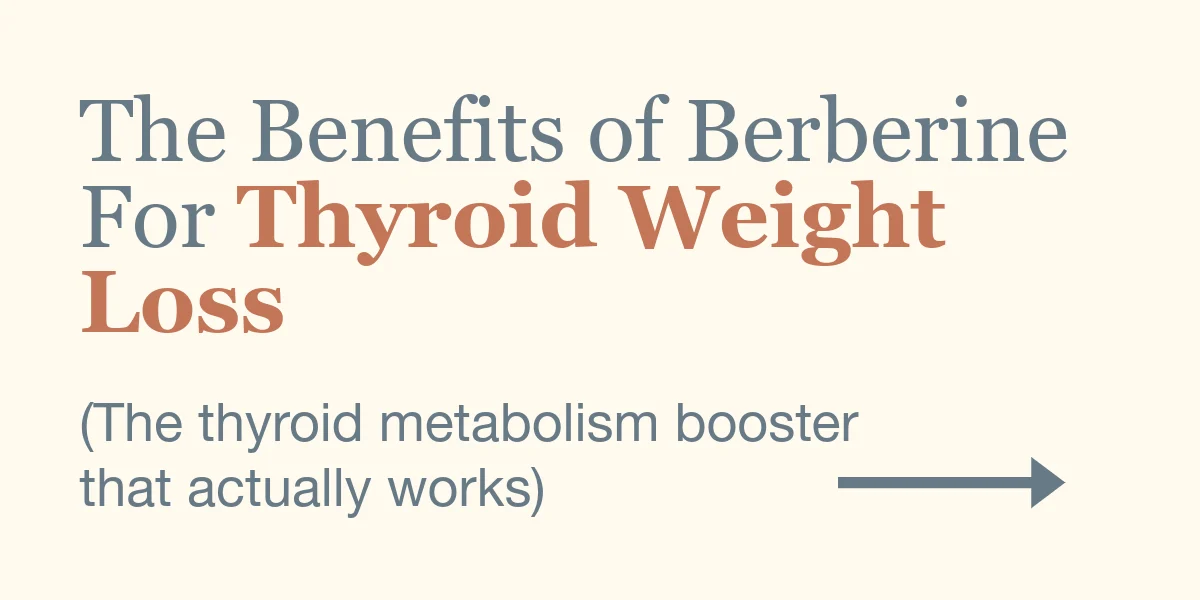One question that I get asked over and over has to do with whether or not the thyroid gland can grow back.
And I get it.
If you are someone taking thyroid medication you have probably asked yourself at some point if taking it will be a forever thing or just a temporary thing.
Many thyroid patients don’t like the idea of being reliant upon thyroid medication for the rest of their life.
What if something happens to thyroid medications? What if their favorite thyroid medication is reformulated? What if it stops working for some reason?
These are all legitimate concerns.
The idea goes that if you can somehow regrow your thyroid gland then you won’t need thyroid medication any longer and your body will be “whole” again.
Is there anything that you can do as a patient to naturally help your thyroid gland grow or increase in size and start doing the things that it used to when it was healthy?
The short answer is probably not, at least not in the way that you are thinking.
There are certain conditions where it may be possible to salvage some of your thyroid gland tissue but once the thyroid gland cells have been destroyed there are no known ways to regrow back dead necrotic thyroid gland cells.
As always, the devil is in the details so don’t get discouraged.
There are several situations in which it still may be possible to reverse some thyroid gland damage and restore some thyroid gland function.
Even if it isn’t possible to regrow your thyroid gland back that doesn’t mean you have to suffer forever, either!
There are still therapies that you can use to improve thyroid function even if you can’t grow it back and we will discuss those later in this article.
Let’s talk about these in more detail:
DOWNLOAD FREE RESOURCES
Foods to Avoid if you Have Thyroid Problems:
I’ve found that these 10 foods cause the most problems for thyroid patients. Learn which foods you should avoid if you have thyroid disease of any type.
The Complete List of Thyroid Lab tests:
The list includes optimal ranges, normal ranges, and the complete list of tests you need to diagnose and manage thyroid disease correctly!
Damaged vs Destroyed Thyroid Gland Tissue
Very few organs in the body have the natural capacity or ability to grow back.
One such organ that does have regenerative capacity is the liver.
In fact, we know that civilizations from long ago knew of the liver’s ability to regenerate because they included it in some of their myths (1)!
In Greek Mythology, Prometheus was doomed to eternal punishment for giving fire to mankind and part of that punishment included his liver being eaten repeatedly by an eagle.
Unfortunately, there is no such myth or story about a regenerating thyroid gland (2)!
Tissues such as your heart cell tissue and brain cell tissues do not have regenerative capacity (3) like the liver.
Think about what happens to someone after a stroke.
A stroke occurs if the brain has been starved of oxygen. The result is that a portion of brain cells are permanently damaged from this oxygen deprivation.
I know what you are already thinking.
What about people who have had a stroke and experience something like the inability to move their right arm but then slowly regain that ability over time?
Doesn’t this mean that their brain tissue is regenerating?
Well, yes and no.
And this is where we must draw a distinction between DAMAGED thyroid gland tissue and DESTROYED thyroid gland tissue.
In the case of stroke, there will be portions of brain tissue that are permanently destroyed and those that are only slightly damaged.
Damaged brain tissue (and thyroid tissue as well) have the ability to recover and this explains why some people can recover post-stroke.
This same principle applies to those people who have thyroid gland DAMAGE.
Thyroid gland damage, if it isn’t severe and widespread, can sometimes be reversed.
So before you think that your thyroid gland is incapable of recovering you need to ask yourself whether your problem stems from thyroid tissue destruction or thyroid tissue damage.
There are several conditions and disease states that cause thyroid gland damage and, if they are untreated, may result in thyroid tissue destruction.
But if you catch them early enough, and if you use the right therapies, then you may be able to prevent or reverse thyroid tissue destruction.
Conditions that result in thyroid gland damage and which are potentially reversible include:
- Hashimoto’s thyroiditis – Hashimoto’s thyroiditis is an autoimmune disease of the thyroid gland that results in damage to the thyroid gland from your own immune system. But what you need to realize is that this damage accumulates slowly over many years. Before any thyroid gland tissue is destroyed it is first damaged. The goal if you have Hashimoto’s is to stop the DAMAGE from occurring so you can prevent the permanent DESTRUCTION of the thyroid tissue. I’ve mentioned different therapies that can be used to reverse this destruction in Hashimoto’s that I would recommend you check out if you have this condition. Certain treatments such as low-level laser therapy, certain supplements, dietary changes, off-label prescription medications, and others can be used to treat Hashimoto’s. If you do not do anything then eventually the damage from Hashimoto’s will eventually accumulate and your thyroid gland tissue will be destroyed.
- Thyroiditis – Another condition that results in damage to the thyroid gland (but usually not destruction) is thyroiditis. Thyroiditis just refers to any condition which causes inflammation in your thyroid. This could be from an autoimmune disease (Hashimoto’s), from an infection, from pregnancy, from trauma, from radiation, and many other causes. What’s important here is that most of the time this damage is not permanent and usually heals over time. When you have these conditions, though, you may see a temporary decline in thyroid gland activity and thyroid gland function. This may result in things like decreased thyroid hormone and symptoms of weight gain or fatigue but these symptoms should subside as your thyroid gland tissue recovers.
These conditions need to be differentiated from other causes of thyroid problems.
Problems such as low thyroid or hypothyroidism from, let’s say, iodine deficiency still may result in similar symptoms as the conditions listed above but the cause is completely different.
In the case of iodine deficiency, your thyroid gland tissue is not damaged or destroyed it just isn’t working properly because it doesn’t have the right building blocks or machinery to work.
Once you supply the right ingredients then the thyroid gland will turn back on and you should be fine.
There are many other conditions like this that can potentially be reversed.
Conditions with Permanent Thyroid Gland Damage
We spent some time talking about conditions that result in thyroid gland damage.
In these conditions, it may be possible to repair your thyroid gland.
Now let’s discuss some conditions that result in permanent thyroid gland damage.
These conditions result in permanent damage to the thyroid gland which means that thyroid gland repair is not possible, at least not with current technology (read more on this below).
With few exceptions, these conditions are typically man-made!

In other words, these conditions result from specific medical procedures.
I’m constantly shocked when I hear that many thyroid patients who have undergone these procedures are surprised to hear that their effects are permanent.
The following conditions result in permanent damage to the thyroid gland:
- Thyroidectomy or partial thyroidectomy – Thyroidectomy refers to surgical removal of the thyroid gland. Patients typically undergo this procedure if they have thyroid cancer, large thyroid nodules, or other problems that compromise the thyroid gland itself. As you might imagine, when you cut something out of the body it is gone forever. Because of this, surgical removal of your thyroid gland should only be done if absolutely necessary. For many conditions that “require” thyroid removal, it may be possible to use certain treatments to either prevent or prolong the time needed until the operation. It’s also important to note that some people only have a portion of their thyroid gland removed when they undergo surgery. This is referred to as a partial or hemi thyroidectomy. If at least half of the thyroid gland is left intake in your body then this thyroid gland tissue can enlarge and may be able to make up for the missing portion. This only works if you still have at least 50% of your thyroid gland remaining, however.
- Radioactive iodine ablation or RAI for short – Another condition that results in permanent thyroid gland damage is known as radioactive iodine. In this condition, thyroid patients are given radioactive iodine which enters into the thyroid gland and causes permanent damage and scarring because of the damage from radiation. Even though the thyroid gland is still left in your neck it is rendered non-functional through this process. Like those who undergo thyroidectomy, RAI can either be “complete” or “partial”. “Complete” RAI results in damage to the entire gland while a “partial” RAI may result in damage to only a fraction of thyroid gland tissue. If you’ve undergone RAI in the past you will need to talk to the doctor who did the procedure to see if you have any functioning thyroid gland left.
- End-stage Hashimoto’s Thyroiditis – This is one medical condition that results in complete thyroid gland damage but isn’t a medical procedure given to patients by doctors. Hashimoto’s thyroiditis is an autoimmune disease of the thyroid gland and, if left unchecked and untreated, will eventually result in destruction of the thyroid gland. This process is gradual and usually occurs over decades but it will occur eventually if the condition is not stopped. There are many treatments and therapies which can potentially halt autoimmune damage to the thyroid gland which you should take advantage of if you are a patient suffering from Hashimoto’s! Do whatever is in your power right NOW to prevent this damage from occurring.
Your Next Steps
If you’ve read this article and you are wondering what you should do next, let me help you out:
The first thing I would recommend figuring out is what type of thyroid condition you are suffering from.
You need to know if your thyroid condition is one that causes thyroid gland damage or thyroid gland destruction.
You should be able to easily figure this out by looking at your diagnosis.
You can use this quick guide to help you figure it out:
- Hypothyroidism – Usually does NOT result in thyroid gland damage or thyroid gland destruction.
- Hashimoto’s – May result in permanent thyroid gland damage if not treated. If you catch the condition early enough then you may be able to reverse damage to the thyroid gland.
- Thyroid cancer – Treatments for thyroid cancer typically cause complete thyroid gland damage such as surgical removal of all or a portion of the thyroid gland or via RAI. This may not be avoidable but, if possible, opt for partial removal of the thyroid gland instead of complete removal.
- Hyperthyroidism – There are many causes of hyperthyroidism. Some of these causes can be treated naturally and others cannot. One of the most common treatments for hyperthyroidism is RAI which may result in complete thyroid gland destruction. If possible, use natural therapies to prevent this!
- Graves’ disease – Graves’ disease is an autoimmune disease that causes hyperthyroidism instead of hypothyroidism. Up to 20-30% of cases may spontaneously resolve (you can increase your chances of this happening by using natural therapies). In cases that do not resolve, the treatment is typically with RAI and RAI does result in permanent thyroid gland damage. If at all possible do whatever you can to increase your chances of remission to prevent this damage.
- Thyroid nodules – Thyroid nodules typically do not result in thyroid gland damage or destruction unless they become big enough to require surgical removal.
- Thyroiditis – Most cases of thyroiditis (with the exception of Hashimoto’s) are reversible and do not result in permanent thyroid gland damage or destruction. They typically go away on their own over a period of time.
Will It be Possible to Regrow the Thyroid Gland in the Future?
That’s a great question and one that I don’t have an answer to.
I operate under the assumption that all problems are potentially solvable given enough ingenuity, time, and technology.
So, in my mind, the idea of thyroid gland regrowth is a solvable problem.
But it’s not necessarily a big enough problem, at least in the mind of many people, to put time, money, and attention into it.
From the perspective of conventional medicine, thyroid gland removal is considered “curative” for many thyroid conditions such as thyroid cancer and even hyperthyroidism.
From their perspective, they aren’t worried about the consequences of thyroid gland removal or radioactive iodine because, from where they are sitting, it’s easily treated with thyroid medication.
You and I both know that it’s not quite that simple, and you know exactly what I’m talking about if your thyroid gland has been removed.
Even though you may be receiving treatment in the form of thyroid medication, does not mean that you are thriving or living your best life.
Don’t lose hope, though!
It’s possible that discoveries in adjacent fields may have application to the thyroid gland.
For instance, stem cell technology (4) (or something similar (5)) would have broad application in MANY disease states and could potentially help those without a thyroid even though it wasn’t developed specifically for them.
This isn’t a reality yet but it’s something that could become possible down the road.
Final Thoughts
While it isn’t possible to regrow thyroid gland tissue that has been permanently destroyed, it may be possible to salvage damaged thyroid gland tissue in certain circumstances.
Those who have undergone certain procedures such as thyroidectomy or RAI will be required to take thyroid medication for the rest of their lives because these procedures are permanent.
Current technology doesn’t allow for regrowth of the thyroid gland but emerging technologies may make it possible at a future date.
The best thing you can do as a thyroid patient is to figure out if your thyroid condition is one that results in permanent thyroid gland destruction or reversible thyroid gland damage.
From there you can take steps to prevent further damage or to potentially reverse the condition causing the damage to your thyroid gland.
Halting or preventing thyroid gland damage in many people, though!
These people should NOT despair. There are still ways for you to manage your thyroid gland through the use of combination T4 and T3 thyroid medications to help you feel as close to normal as possible.
Now I want to hear from you:
Do you have permanent thyroid gland damage?
Do you have any condition which results in thyroid gland damage instead of destruction?
Have you had any success in halting or preventing your condition and restoring thyroid function?
Have you been able to get back to “normal” using thyroid medication?
Let me know in the comments below!
Scientific References
#1. https://www.sciencedirect.com/science/article/pii/S0168827810003259
#2. https://www.ncbi.nlm.nih.gov/pmc/articles/PMC3339649/
#3. https://www.ncbi.nlm.nih.gov/pmc/articles/PMC3377117/
#4. https://www.ncbi.nlm.nih.gov/pmc/articles/PMC3995070/
#5. https://www.ncbi.nlm.nih.gov/pmc/articles/PMC7067448/









